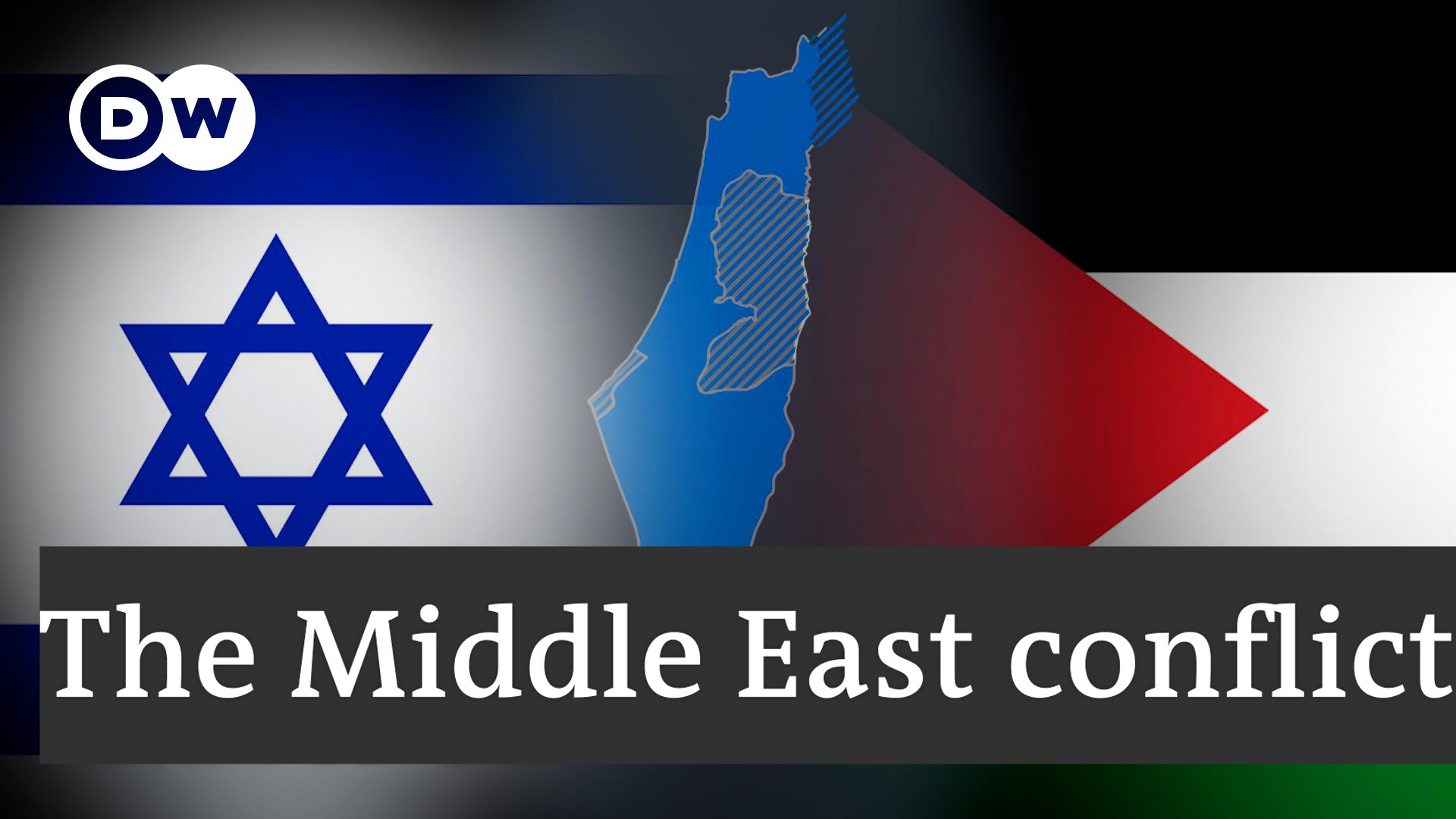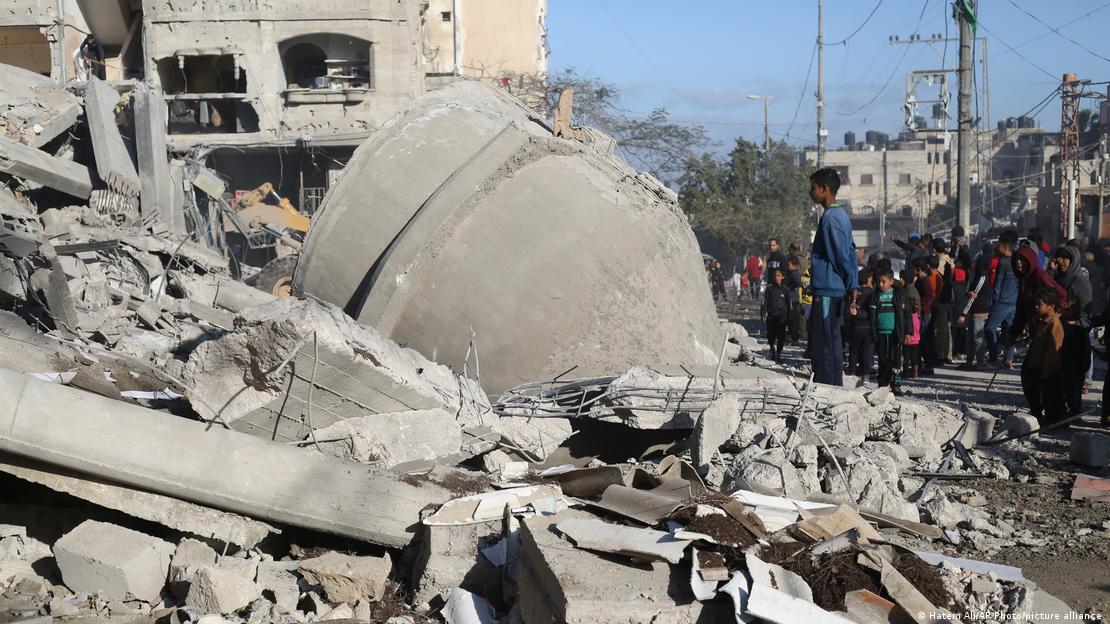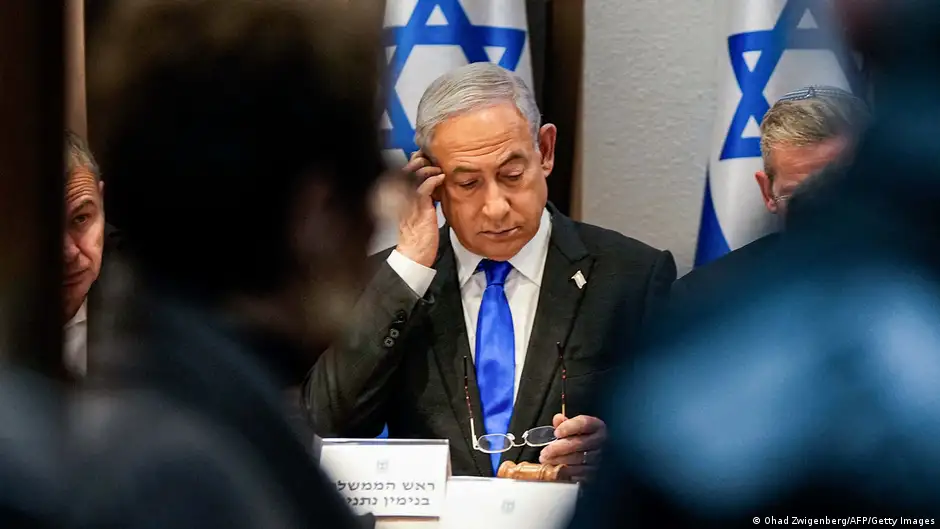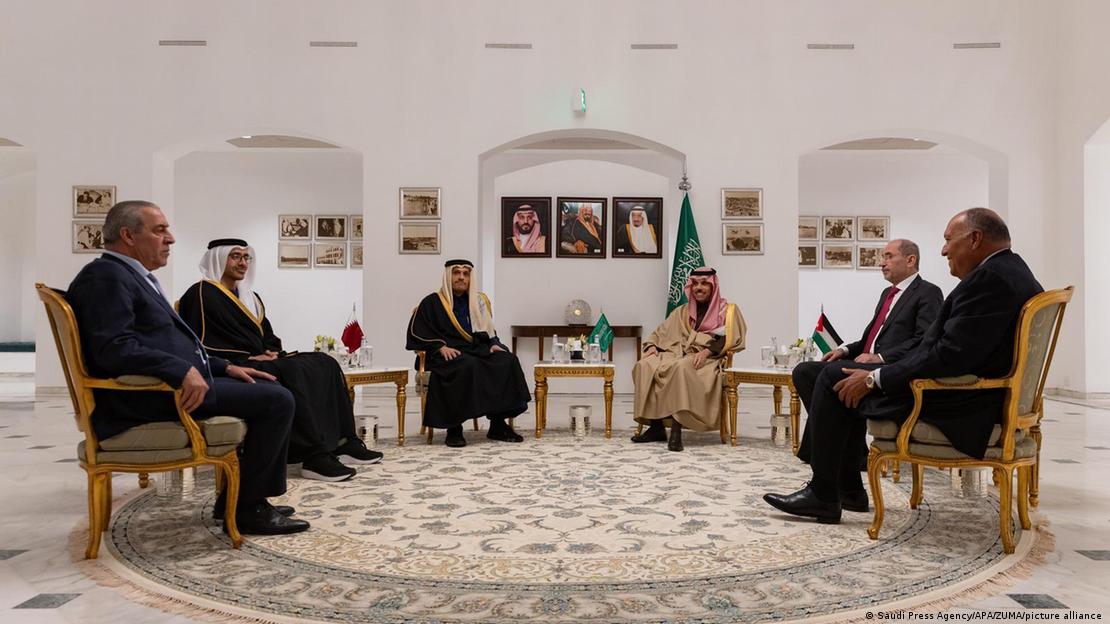Seven uncomfortable truths

Regional tensions will not de-escalate without a ceasefire in Gaza. The war between Israel and Hamas is directly or indirectly affecting all nations, their governments and 400 million people in the Middle East.
The military clashes on the Israeli-Lebanese border, the missile attacks on cargo ships in the Red Sea, attacks on U.S. troops in Iraq, Syria and Jordan as well as subsequent American retaliatory action, Israeli missile attacks on Syria and the targeted killing of high-ranking militia leaders – these are all sideshows destabilising parts of the region.
Yes, people in Syria, Lebanon, Saudi Arabia, Egypt and Iran are suffering first and foremost because of the unscrupulousness and incompetence of their rulers, but in many places, the historical conflict between Israelis and Palestinians over land serves as a projection screen, a pretext or to fan the flames of conflict. It cannot be managed with security measures nor resolved by military means.
The axis of resistance is capable of more than terror. Its members – Hezbollah in Lebanon, Hamas in the Palestinian territories, the Houthis in Yemen, the Islamic resistance in Iraq and the Iranian-controlled militias in Syria – all share a common ideology with their sponsor Iran: enmity towards Israel and the USA.
But this isn't just used to justify the armed struggle, it's also a way for them to gain political power and social influence in their respective countries. They participate in governments, control regions and benefit from injustice, state failure and local conflicts. The war in Gaza is boosting their popularity – at home and across the region as a whole.

Hamas, Hezbollah and co. have their own agendas
But Hezbollah, Hamas, Houthis and the like aren't simply taking orders from Tehran, they're also hybrid actors with their own sets of interests. To regard them simply as aberrant terrorist gangs in the service of Iran doesn't go far enough. For sure, they would struggle to operate without the financial and military support of the Islamic Republic, but not every rocket launch or drone attack is coordinated with the leadership in Tehran.
It also had no prior knowledge of plans for 7 October. Operational autonomy with simultaneous strategic coordination by the Iranian Revolutionary Guards – this formula enables rulers in Tehran to ramp up pressure on the common enemy Israel and the USA without taking responsibility for it.
No one wants full-scale war, but individual flashpoints can still get out of control. A direct confrontation between the USA and Israel on the one side and Iran and its allies on the other would come at a huge cost to everyone and is therefore in nobody's interests. The threats and sabre rattling continues, but the military attacks remain limited. They are aimed at deterring the enemy and encouraging a retreat; while at the same time signalling strength and determination to their own clientele.
But proxy wars harbour the risk of escalating unintentionally due to opaque chains of command and the fact that conflict parties aren't communicating directly with one another. To prevent this, those involved must shoot less and talk more.
U.S. and British attacks on Houthis are counterproductive
American and British missile attacks on Houthi positions in Yemen aren't making Red Sea shipping safer – drone defence manages that perfectly well – they're turning the Houthis into heroes in the fight for the Palestinians and against Western imperialism. Equally counterproductive are Israel's attempts to drive Hezbollah from the border with military force, so that tens of thousands of evacuated Israelis can return to their homes and live in safety.
Although from the area north of the Litani River 30 km from the border, Hezbollah can no longer fire precision-guided missiles at border towns, its rockets can still reach targets in Israel. Israeli intimidation is also boosting Hezbollah's standing within the populace. In Lebanon too, tens of thousands of people have fled from the south; Israel is seen as the aggressor.
In view of an imminent Israeli offensive, many see Hezbollah as necessary resistance, even those who have nothing in common with the Shia Party of God and in more peaceful times would be calling for its disarmament. Diplomatic efforts are more promising, but without progress in Gaza these will come to nothing, as Hezbollah is only prepared to negotiate its withdrawal if Israel halts its attacks on Gaza.

"Effective diplomacy needs engagement with all sides"
While Europeans are focusing on Ukraine and Iraq, the oldest of the Middle East issues will haunt them for some time. The wider Israel–Palestinian conflict needs the full attention of Europe, writes Mattia Toaldo
Netanyahu and his partners: an obstacle to peace
Netanyahu needs crisis mode to stay in power. Israel's prime minister was prepared to abolish the independence of the judiciary to save his political career, engaging with fascists to do so. These utilised elements of the Israeli army to enforce their settlement and annexations plans, which contributed to security force failures on 7 October. The process of reappraising these political and military-strategic errors will begin as soon as the war is over; most Israelis are already calling for Netanyahu to step down.
That's why the prime minister has no interest in bringing the conflict to a swift end, he needs a permanent state of crisis to restore his image as Mr. Security. He promises not to relinquish security control over Gaza, to prevent a sovereign Palestinian state and to end Hezbollah bombardment in the north, even if this may result in an open confrontation with Lebanon.
Instead of making concessions to free more hostages, Netanyahu and his right-wing extremist government are fanning the flames of the conflict to push through their own power fantasies. They are not partners, but an obstacle on the path to peace.
Unique opportunity for the settler movement
Israel's radical settlers and nationalists mean business and what's happening in Gaza serves their goals. The Hamas attack has bolstered Israel's right-wing extremists; some of their racist views are reflected within the public. For the settler movement, the war in Gaza represents the one-off opportunity to promote their visions of a Greater Israel: the permanent settlement of the West Bank and Gaza, which goes hand in hand with the institutionalised unequal treatment of Palestinians (apartheid under international law) or their expulsion.
These openly presented plans fly in the face of international law, UN resolutions and what the rest of the world, including close allies of Israel, regard as a solution to the conflict between Israelis and Palestinians.
Nevertheless, there's little resistance. Americans and Europeans repeat what's not allowed to happen in Gaza without admitting that this is exactly what Israeli warfare is amounting to. No territorial changes? To the south of Gaza City, the army is building a military road from East to West that divides the territory and establishes a buffer zone along the border, twice as large as before. Of the 2,850 buildings there, Israeli TV broadcaster Channel 12 says 1,100 have already been destroyed; farmland is also affected.
No permanent displacement of the local population? 1.9 million people are now refugees in Gaza, the destruction of homes and infrastructure – more than half of residential buildings, hospitals, universities, schools, mosques and churches have been damaged or destroyed – is hampering the prospects of return and a future existence.
Netanyahu's 'day-after' plan: renewed occupation
No Israeli occupation and settlement of Gaza? Netanyahu's 'day after' plan for Gaza may not entail settlement construction, but it does envisage a permanent military presence. Under his plan, the Israeli army should retain "unlimited operational freedom" and control of all land west of Jordan, i.e. all access by land, sea and air. The Palestinians are to be "demilitarised" and "deradicalised" and self-governed "as far as possible". This is a situation they are already familiar with – it's called occupation.
The most specific plans for post-war Gaza are coming from pro-settler organisations and real estate companies: Beach-side villas and the "promotion of voluntary emigration" aimed at scattering the population of Gaza throughout the world and destroying it as a group (genocide under international law).
The International Court of Justice has called on the Israeli government to prevent and punish the direct and public incitement to hatred and expulsion and protect the people in Gaza from it. At a "Victory of Israel" conference in Jerusalem, 11 ministers in the Israeli government celebrated the resettlement of the Gaza Strip. It is high time that any support for this government comes with strings attached.

Both sides are in denial
Using military means alone to fight Hamas is strengthening them politically. Hamas is already more popular than it was before 7 October – not necessarily in Gaza, but in the West Bank their approval ratings have tripled. Although many people don't share their Islamist ideology, they respect them as a "resistance movement".
Although people in the Middle East reject crimes such as those perpetrated on 7 October – sexual violence, the slaughter of civilians and the abduction of women and children – they fete Hamas as the only actor achieving something for the Palestinian cause – even if that's just steering international attention onto the suffering of the Palestinian people. The 7 October atrocities are either played down or dismissed as fake news.
This reality denial has assumed frightening proportions on both sides: the 7 October massacre is being ignored and denied in the Arab world; people in Israel don't want to see the suffering of civilians in Gaza. Existential fears intermingle with the desire for revenge, the other is dehumanised as a way of doing them maximum harm. But rather than creating any kind of security, this just generates more terror and violence.
"The world must find a way to interact with Hamas"
After months of war, the aim of obliterating Hamas as a militia is proving to be unrealistic. Even if most of the fighters in Gaza in dead and all the tunnels and rockets have been destroyed, any remaining supporters will reform and find new recruits.
And they don't need many to act as spoilers torpedoing any attempts to establish a post-war order. For this reason alone, it would appear sensible to use existing channels to the Hamas leadership in Doha for the hostage negotiations and indirectly involve pragmatists within Hamas.
Hamas will also continue to exist as a political party, social movement and ideology. That's why the world must find a way to interact with it, just as it once did with Yasser Arafat's Fatah – elevated from terrorists into negotiating partners when there was hope for a political solution to the conflict during the hammering out of the Oslo accords.
Recent documents show that there are politicians within Hamas open to progress along comparable lines. In contrast to the organisation's founding charter of 1988, its 2017 policy document no longer contains any anti-Jewish references; Hamas declared its willingness to accept a Palestinian state within the 1967 borders. The charter states that Hamas is not waging a war against Jews, but against the occupation.
In January, Hamas published a 16-page report which also explains its motivations for the 7 October terror attack. The document is titled "Our Narrative… Operation Al Aqsa Flood" and deserves attention – even as a piece of propaganda.
Demonising Hamas only makes it stronger
The "operation" targeted Israeli military sites and was aimed at detaining soldiers for a prisoner exchange, the report read. The Al-Qassam Brigades' fighters were committed to "avoiding harm to civilians, especially children, women and elderly people". Any targeting of civilians happened "accidently" and as "faults" due to the rapid collapse of the Israeli security and military system. What sounds like a mockery of the victims corresponds to the narrative in the Middle East.
In its report, Hamas also refers to investigations and statements from the International Criminal Court and the International Court of Justice, thereby speaking the language of the West. In statements aimed at the anti-colonial left wing and the Global South, it writes that it is not fighting against Jews because they're Jews, but against the Zionists occupying Palestine: "Yet, it is the Zionists who constantly identify Judaism and the Jews with their own colonial project and illegal entity".
The document is evidence of strategic thought processes within the Hamas leadership. Members of this leadership will attempt to convert their current popularity into political influence; any route to a solution to the Palestinian question must lead to them. Negotiations between Fatah and Hamas are already underway; Hamas could join the PLO in the medium term.
Hamas may not need to be involved in a transitional Palestinian technocratic government, but it should agree to it. Governing against the movement won't work; excluding and demonising Hamas is only making it stronger. This realisation may be bitter, but it is inescapable, even for the Americans and the Europeans.

The two-state solution is dead, but without Palestinian sovereignty, there can be no future for Gaza and no normalisation of Arab-Israeli relations. For a solution in Gaza, to give dignity to the Palestinians and security to the Israelis, the withdrawal of the Israeli army and the free but internationally monitored movement of goods and people is fundamental.
After all, no Arab nation will want to get involved in Gaza while it is under permanent Israeli military control. However, the financial, political, economic and possibly military support of neighbouring states is crucial for Gaza's resurrection.
That's why U.S. Secretary of State Anthony Blinken is making regular trips to Saudi Arabia, Qatar, Jordan and Egypt before conducting talks in Tel Aviv and Ramallah. In a bid to wrest a commitment to a sovereign Palestinian state from the Israeli government, he's attempting to lure it in with improved relations with its Arab neighbours. Blinken knows: for a normalisation of relations with Israel and unlike in the past – Saudi Arabia and other states will insist on Palestinian self-determination.
As this isn't on the cards, it must at least be promised by Israel and promoted by the U.S. and Europe. Should the Israeli government continue to deny Palestinians the right to state sovereignty, the Americans and Europeans should follow the example of the more than 100 countries that have already recognised Palestine as a state. Then, the unilateral position wouldn't be global recognition, but Israel's denial of Palestinian statehood.
Ultimately, the two-state solution envisaged in Oslo 1993 won't be realised, because most of what are now 700,000 Israeli settlers in the West Bank and East Jerusalem aren't just going to disappear into thin air – they're not going anywhere. A more realistic prospect might therefore be a confederation of two states – a proposal that experts have been mulling over for years that would solve the two big problems: the continued existence of Israel as a Jewish state and the Palestinian right of return.
This would allow for the existence of an Israeli and a Palestinian state (more or less within the 1967 borders), whose citizens – like those living in the European Union – are permitted to live in the other country without acquiring citizenship there. A settler remains an Israeli citizen and votes in Israel, even if he lives in the West Bank and is subject to the laws there.
A Palestinian from Berlin or Bethlehem becomes a Palestinian citizen and elects parliament in Ramallah, even if he moves to Haifa or Tel Aviv. Laws would control immigration on both sides. Israel would remain Jewish and Palestine Arab – but people could live where they want or stay where they are.
This is difficult to imagine in the current situation, with such levels of mistrust, fear and hatred on both sides. But without vision, there can be no rapprochement. And without rapprochement, there will only be more violence and escalation – across the region as a whole.
Kristin Helberg
© Qantara.de 2024
Translated from the German by Nina Coon
